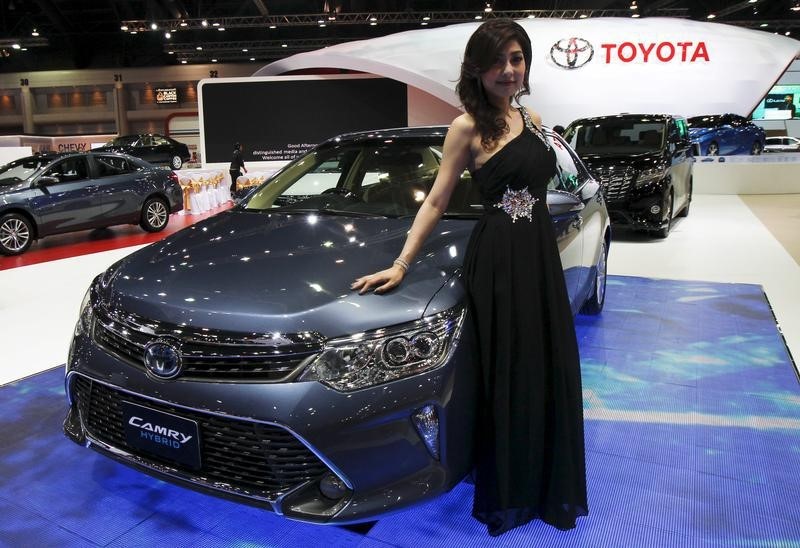By Chang-Ran Kim
TOYOTA CITY, Japan (Reuters) - Toyota Motor (T:7203) is looking to cast off a reputation for making reliable, but often dull, cars in a wide-ranging review of its designs, technologies, factories and supply deals - a full makeover aimed at staying on top in a cut-throat industry.
For decades, the Japanese automaker carved out global leadership by using common parts across many of its models. This was efficient, but made for uniform styling. A one-size-fits-all layout for the engine's surrounding parts, for example, gave its cars a boxy front end.
Under its ongoing Toyota New Global Architecture (TNGA) initiative, the automaker will standardize vehicle engineering, such as the optimal 'hip point' seating position for different vehicles, from sedans and sports cars to SUVs and trucks. This cuts the number of air-bag variations needed and allows air-bag modules to be installed from just one side of the assembly line rather than both, making plants more efficient.
Redesigning cars from the ground up, Toyota plans to lower the hood, or bonnet, and center of gravity for better styling and handling. The new vehicle platforms, to feature more fuel efficient engines and rigid, lightweight frames, will be rolled out in stages starting with a medium-sized car this year, widely expected to be the fourth-generation Prius hybrid.
The savings from this overhaul - to be at least a fifth of Toyota's development costs - would be used to add or tailor other high-tech features, such as auto-braking, to suit different markets.
This approach is not new. Volkswagen (DE:VOWG_p), Toyota's rival for the title of the world's biggest automaker, has already rolled out its Modular Transverse Matrix (MQB) in more than a fifth of its vehicles.
In a progress report on Thursday, Executive Vice President Mitsuhisa Kato, the architect of the TNGA outline, said Toyota expects about half of its vehicles in 2020 to feature TNGA platforms.
TNGA reflects the changing nature of the global auto industry. As rivals close the gap on quality and fuel economy, styling and cutting-edge features have become the key battleground. More car for the same price.
"TNGA is not just a more cost-effective way of designing the automobile" to play catch-up with Volkswagen and others, said a senior Toyota executive, who didn't want to be named because he is not authorized to speak to reporters. "It changes fundamentally the way we design and procure technologies and manufacture final finished products using those technologies."
MODULAR DESIGN
Since taking the helm in 2009, Akio Toyoda has sought to steer the company founded by his grandfather back to making more appealing cars instead of what he called reliable but unexciting products that fueled Toyota's rise in the last century.
"Other automakers would design parts to accommodate exterior styling," said Satoshi Hino, a former Mazda Motor (T:7261) engineer and consultant specializing in modular architecture. "Having fewer parts was important in the 20th century because it helped secure quality. But in the 21st century, you have to make unique, attractive cars while still trying to limit new parts. Modular design allows that, and it's what TNGA is after."
With modular design, pioneered by Volkswagen's Swedish truck unit Scania
With TNGA, Toyota aims to halve the investment required to retool factories for new models compared with pre-financial crisis levels in 2008, while slashing investment on new factories by about 40 percent, the company said on Thursday.
SUPPLIER SHAKE-UP
TNGA will also bring profound changes for Toyota's group suppliers.
Traditionally, Toyota's suppliers were forced to design parts to meet specifications that were optimal for individual car models - even where other automakers employed globally compatible standards.
TNGA will change that, with Toyota using global standards for certain parts - a move that would weed out weaker suppliers while landing more business for others.
Kato said this would allow Toyota's group suppliers to sell the parts to other automakers, boosting their competitiveness and benefiting Toyota.
To that end, Toyota said in November it would consolidate the development and production of diesel engines, manual transmissions and brakes at three group suppliers, helping top-tier firms such as Denso (T:6902) and Aisin Seiki (T:7259) focus on cutting-edge technologies and compete with global rivals such as Bosch [ROBG.UL] and Continental (DE:CONG).
For the first time, Toyota will also add an official from both Denso and Aisin Seiki to its executive line-up next month.
Ultimately, the test for TNGA will be whether the new generation of Toyota cars appeals to buyers.
"Competition will be even fiercer as demand in developed markets saturates and consumers become more selective in developing countries," said Satomi Hamada, senior analyst at consultancy IHS Automotive.

"Toyota needs to boost its product appeal, and quickly, to avoid losing market share."